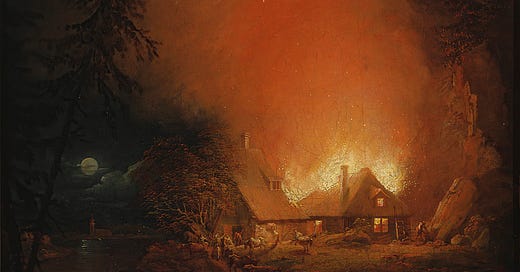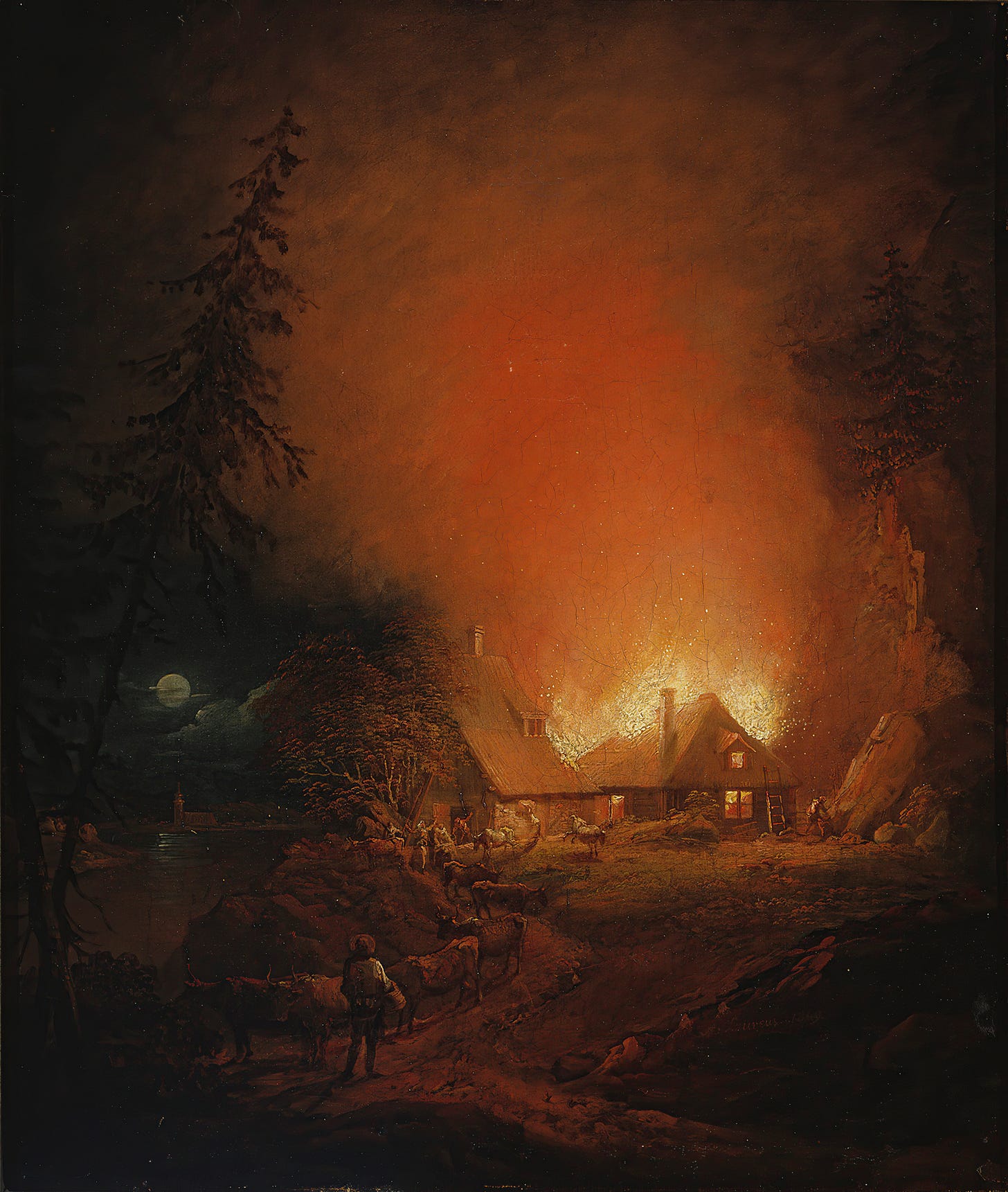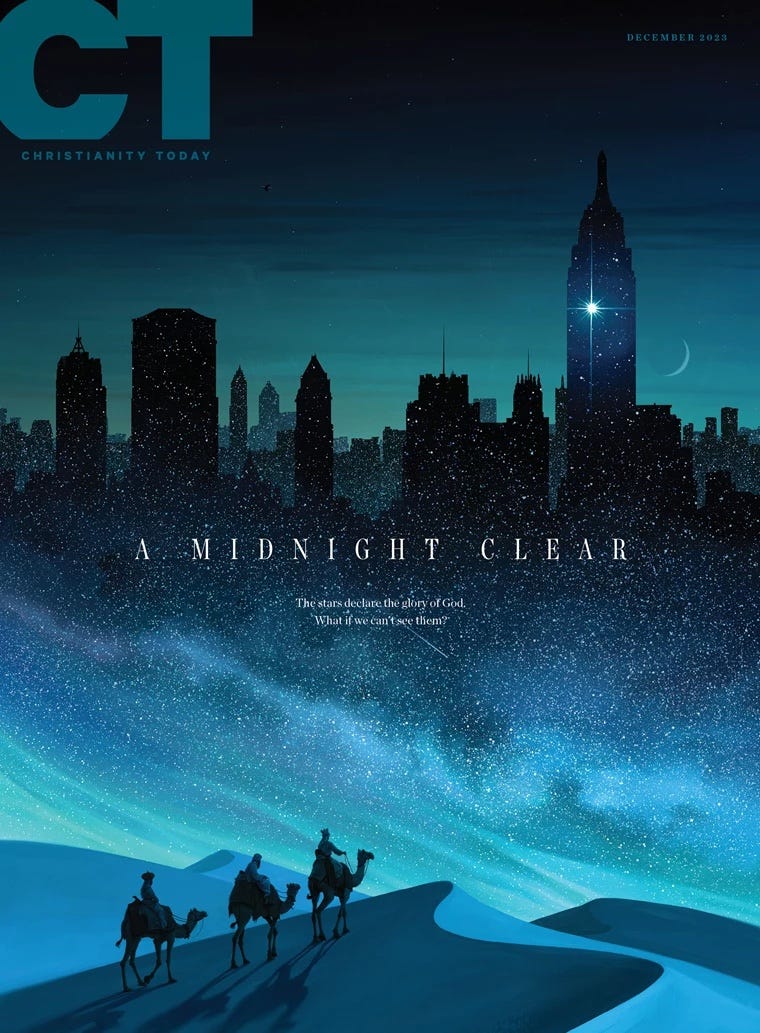This Mid-Week Edition of Ecstatic features Leighton Kennedy
The dark night of the soul, a term coined by St. John of the Cross, is one that aptly describes the season in which I’m writing these words. When people talk in real time about their experiences with spiritual warfare, existential life changes, or mental health battles, it can feel a bit murky. When it’s you, a sense of embarrassment or unease might make you regret opening your mouth; when it’s your friend, you just think, “am I saying the right thing? Am I being helpful?” There’s a darkness that hangs over those kinds of conversations—to be expected, I guess.
Low seasons are not my specialty; I’d like to say I’m not cut out for them, but perhaps that’s just because I’d rather feel the more zealous emotions: anger, joy, passion, crying-in-your-room sorrow, and hope. Oh, I love hope. But I don’t like anything in between. I don’t like feeling bummed, disappointed, bored, or lost. When I’m simply okay I want to be 100% great. And when I’m not okay, I want to feel it hard and then move on back to 100%. I want to move through the feelings quickly, and then find something to be happy about again.
But that’s not how we roll in the dark night of the soul. C’est la vie, as they say. The truth is that lately, for every 10 days of peace and self-controlled focus on my spiritual health, I get one or two days of crash and burn. For me, that feels like I lost a video game level that I worked hard to achieve, and now I have to do it all over again.
That’s how it feels as I read David’s Psalms sometimes, too. And yet I’m drawn to them like a lifeline. I’ve come to feel the rhythms of how David experienced his emotions; I can even picture the tear stains and crumpled edges of his paper. At first, one might think he’s pretty inconsistent—he begins in misery, claiming that God isn’t listening, and then talks a lot about crushing his enemies and something about the “power of the dog,” but he always ends with hopeful praises to the Lord. But then you turn the page, and he’s back to lamenting. What gives?
The dark night of the soul holds the same rhythms of David’s Psalms—in fact, they’re the theme songs. I’m learning now that this season isn’t something to overcome, but something that we must walk through with God. There isn’t a “secret chord” we can play to unlock the next level of understanding and growth from God; we can’t chart a path out of suffering. We can’t self-medicate with self-help books, and I assure you the answers cannot be found through search engine optimization.
You may be asking yourself, “So what is the dark night of the soul?” I don’t know exactly what it may be like for you or for St. John of the Cross, but I believe the basics are this: a stretch of time where God’s moving hand seems absent, where life feels void of divine intervention, where it’s harder than ever to see hope and the results of spiritual practices. A time when you feel like you’re doing everything right, and yet everything around you seems to go wrong or be fruitless. Detachment rather than abundance; silence rather than affirmation. Foundations cracking, losing control, the whole bit. Think of hiking alone in a dry, parched landscape; or treading water and hoping your strength doesn’t fail you.
Despite the sense of meaninglessness, I have found that there is a profound reason at play. C.S. Lewis says that God “leaves the creature [that’s me] to stand up on its own legs” and “it is during such trough periods, much more than during the peak periods, that it is growing into the sort of creature He wants it to be.”
If I could, I’d call C.S. Lewis up myself and argue for the eminent value of those “peak” periods he’s talking about. But I can’t, and I suppose I really wouldn’t want to. Flannery O’Connor understood this when she said, “The frenzy [of petition] is caused by an eagerness for what I want and not a spiritual trust.”
I know God is doing a work of trust in me. I know that though my soul is downcast, there is no one else to turn to. In the gospel of John, when many leave Jesus’ side, he asks the disciples if they would leave, too. And Peter says, “Lord, to whom shall we go?” (6:67-68).
It may be really dark in the night of the soul, and there may be times when I get overwhelmed, but deep down, I know Jesus is there. He’s with me, clarifying me, stripping away much of the brittle comforts I cling to. While it hurts like hell, it’s pretty far from actual hell.
So why do I tell you of the pains and disappointments of this season? John Eldredge says in his book Walking with God, “Whatever else might be the reason for our disappointments, there is no question that God uses them to draw us to himself. To wean our hearts from every other perceived source of life, so that we might come to find our life in him.” So, let God lead you on the path of life, even if it is dark at the moment.
The reason I write this now, and not when I have ended my dark night, is because there is more hope to be had than in longing for the ending of this season; hope is available to you now in the midst of this season.
It’s easy, and very nice, to read about the aftermath of a dark night. We can find stacks full of books, folders full of articles, and playlists full of podcasts by people who have walked through a dark night, and wrote their story with the happy ending intact. Like I said, that’s very nice. Maybe by the time you read this, I’ll be at the end of my own dark night. But I wanted to at least write these words within the late hours of my watch.
A poem by St. Teresa of Avila says, “Let nothing disturb you; Let nothing make you afraid; All things pass; But God is unchanging.” We have to sometimes be disturbed and be afraid to learn that the fear of the Lord is stronger than fear itself. And so I will sit in this place. I will read David’s psalms. I will have bad days, and good ones, too. I will find joy in the simple moments of peace and rest. And you can, too.
“I continued in oblivion lost,
My head was resting on my love;
Lost to all things and myself,
And, amid the lilies forgotten,
Threw away all my cares.”
— St. John of the Cross
Leighton Kennedy
Writer & Communications Professional
Thoughts on this essay? Leave a like and share in the comments!
New Releases: Things we’re excited about at Ekstasis
The December Issue of Christianity Today: “A Midnight Clear”
New Finds: Treasures from the ether
The Most Dangerous Thing in Culture Right Now is Beauty by Ted Gioia
Subscribe to Ecstatic, and order your Ekstasis Print Edition today.










Yes yes yes to all of this!
So appreciated your writing and the profound wisdom here - thank you for writing it out of the depths and the honesty there. I was just thinking the other day how silent and still things feel and asking God to speak to me, so I cried reading the part where you talk about that silence and feeling the detachment and fruitlessness of the season. Reading your words gave me more hope and thankfulness that God has given me moments of simple peace and rest, even in the midst of not being able to see a step in front of me.